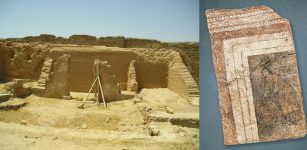Artemisia I Of Caria – Pirate Queen And Ally Of Xerxes I Was Loyal To No-One Except Herself
Ellen Lloyd - AncientPages.com - In ancient Greece, women had limited rights, and they were considered less valuable than men. Greek Queen Artemisia I of Caria was luckier than lower-class women because her status offered more freedom, influence, and power.
Artemisia at the Battle of Salamis. On the identification with Artemisia: "...Above the ships of the victorious Greeks, against which Artemisia, the Xerxes' ally, sends fleeing arrows...". By Wilhelm von Kaulbach.
Credit: Public Domain
Artemisia I of Caria, who reigned between 484-460 B.C.. was an intelligent and courageous woman who showed no fear in battles. She was respected by Xerxes I, King of Persia, who made her an ally.
Several historians have debated her feelings towards Greece and Persia. She plundered both Greek and Persian ships, and she seemed to be loyal to no-one except herself.
Who Was Artemisia I Of Caria?
Much of our knowledge about Artemisia I of Caria comes from the writings of ancient Greek historian Herodotus (84 BC – c. 425 BC.)
Born in Halicarnassus, an ancient Greek city in modern-day Bodrum in Turkey, Artemisia was the daughter of Lygdamis of Halicarnassus ( 520–484 BC), the first tyrant of Caria under the Achaemenid Empire that was founded by Cyrus the Great.
The Achaemenid Empire was not only the first Persian Empire but also the world's largest empire. In 480 B.C, the empire accounted for approximately 49.4 million of the world's 112.4 million people. At that time, the number was equal to 44% of the world's entire population! This was thus by no means a small and defenseless empire.
Rock relief of Xerxes at his tomb in Naqsh-e Rustam. Credit: Public Domain
Who Artemisia's mother was, has never been historically documented.
Artemisia became a ruler after her husband's death. She was left with a young son, but this didn't stop her from becoming a pirate.
"Ancient Mediterranean piracy was not identical to the modern conception of piracy. These ancient pirates were not bands of outlaws who swore allegiance to no one; they were more like enemy powers who raided other city-states on both land and sea.
Their methods, however, would be copied by more modern pirates—methods such as lying in wait for their prey, plundering large merchant ships, and using the geography of the area to their advantage. More important, these ancient pirates set the tone for more modern pirates, who would likewise follow their desire for riches to the sea and take them by any means necessary. Piracy was more accepted in ancient times than it is today because it was more like intertribal warfare than nationless piracy, "Laura Sook Duncombe explains in her book Pirate Women.
Artemisia Was The Only Naval Officer Who Advised Xerxes I Against The Battle Of Salamis
When Artemisia's city Caria fell under Persian control, she participated in several battles as a Persian ally. As a queen, she had many responsibilities, such as engaging in a war against rival city-states. She did not just command her fleet but often took the helm of her ship.
Artemisia I of Caria was a good strategist and could anticipate possible dangers, better than many other military officers. She had been sailing with Xerxes I, King of Persia, for some time and knew his goal was to conquer all of Greece. As Duncombe stated, "Xerxes was very concerned about his chances in a naval battle. His Persians were not particularly skilled sailors. Their capital city, Sula, was nearly a thousand miles from the sea, and they had not even had a navy of their own before the war."
Battle of Salamis (Die Seeschlacht bei Salamis). Artemisia appears highlighted center-left of the painting, above the victorious Greek fleet, below the throne of Xerxes, and shooting arrows at the Greeks. Wilhelm von Kaulbach. Credit: Public Domain
Before the Battle of Salamis, Xerxes I gathered all his officers and asked them whether he should engage in the battle or not. All his naval officers said the Persian army should fight against the Greeks. Artemisia was the only naval officer who advised Xerxes I, King of Persia against engaging in the Battle of Salamis, the first great naval battle recorded in history.
Xerxes I listened to her and her arguments but decided to follow the advice of his naval officers who showed support for the battle. This was a fatal mistake. During the Battle of Salamis, the Greek commander, Themistocles, lured the Persian fleet into the narrow waters of the strait at Salamis, where the massed Persian ships had difficulty maneuvering. The Greeks then attacked furiously, ramming or sinking many Persian vessels and boarding others. The Greeks sank about 300 Persian vessels while losing only about 40 of their own.
Winged female figure in kneeling-running stance, holding kerykeion and victory wreath, on the coinage of Caria around the time of Artemisia. Credit: Classical Numismatic Group, Inc., Wikipedia, CC BY-SA 3.0
The rest of the Persian fleet was scattered, and as a result, Xerxes I had to postpone his planned land offensives for a year, a delay that gave the Greek city-states time to unite against him.
The Persian king's fleet was defeated, but Xerxes I had now an even higher opinion of Artemisia's military skills and he praised her for her leadership in action during his fleet's defeat. During the Battle of Salamis in September 480 B.C. Artemisia I Of Caria led the forces of Halicarnassos, Cos, Nisyros, and Calyndo. She supplied five ships, and according to Herodotus, "her ships were reputed the best in the whole fleet after the ships of Sidon; and of all his allies, she gave the king the best counsels."
Artemisia's Clever Trick Fooled The Greeks
On one occasion, Artemisia's ship was followed by the Greeks. When she felt she couldn't escape, she fooled the Greeks. She quickly ordered the Persian colors to be taken down and fired on a Persian ship. Her cunning tactical maneuver misled the captain of the Athenian ship. He was a little confused at first, but he realized he must have made a mistake. Artemisia's ship must have been either a Greek ship or it was deserting from the Persians and fighting for the Greeks. Not knowing that Artemisia was on the ship, he ceased the pursuit, and she was free.
The Jar of Xerxes I, found in the ruins of the Mausoleum at Halicarnassus, may have been offered by Xerxes to Artemisia I, who had acted with merit as his only female Admiral during the Second Persian invasion of Greece. Credit: Public Domain
After the Battle of Salamis, Xerxes I sought Artemisia's advice. Should he lead troops to the Peloponnese himself, or withdraw from Greece and leave his general Mardonius in charge?
Artemisia told the Persian king the best cause of action for him was to retreat back to Asia Minor. She supported Mardonius' plan who requested 300,000 Persian soldiers who would defeat the Greeks in Xerxes' absence.
This time Xerxes I followed her advice. According to Herodotus, the Persian king left his general Mardonius in charge and sent Artemisia to Ephesus, where she took care of his illegitimate sons.
This was a good agreement because her lands did well by their alliance with the Persians.
Whether Artemisia I Of Caria really gave up seafaring life to care for Xerxes's sons is uncertain. However, she did keep a much lower profile and maybe even retired, fearing her treachery against Xerxes I could one day be revealed. Whether she destroyed a Persian ship during the Battle of Salamis is unknown, but she did fire, which would not have pleased Xerxes I.
Updated on April 12, 2022
Written by Ellen Lloyd – AncientPages.com
Copyright © AncientPages.com All rights reserved. This material may not be published, broadcast, rewritten or redistributed in whole or part without the express written permission of AncientPages.com
Expand for referencesMore From Ancient Pages
-
 A King’s Discovery Of A Mysterious Underground World
Featured Stories | Mar 30, 2024
A King’s Discovery Of A Mysterious Underground World
Featured Stories | Mar 30, 2024 -
 Illegal Journey Of 2,000 Historic Artifacts Hidden In Truck Under The Guise Of Parquet
Artifacts | Jan 3, 2021
Illegal Journey Of 2,000 Historic Artifacts Hidden In Truck Under The Guise Of Parquet
Artifacts | Jan 3, 2021 -
 Unknown Highly Advanced Civilization Created Malta’s Cart Ruts With Sophisticated Machinery
Ancient Technology | Apr 26, 2014
Unknown Highly Advanced Civilization Created Malta’s Cart Ruts With Sophisticated Machinery
Ancient Technology | Apr 26, 2014 -
 On This Day In History: Antonio Neri Was Born in Florence, Italy – On Feb 29, 1838
On This Day In History | Feb 29, 2020
On This Day In History: Antonio Neri Was Born in Florence, Italy – On Feb 29, 1838
On This Day In History | Feb 29, 2020 -
 Mystery Of Vangchhia Ancient Site: Water Pavilion And Ingenious Idea Of Water Harvesting
Archaeology | Feb 21, 2019
Mystery Of Vangchhia Ancient Site: Water Pavilion And Ingenious Idea Of Water Harvesting
Archaeology | Feb 21, 2019 -
 Ancient Indian Text Re-Writes History Of Number Zero And Mathematics
Archaeology | Sep 15, 2017
Ancient Indian Text Re-Writes History Of Number Zero And Mathematics
Archaeology | Sep 15, 2017 -
 Discovery Of Fortified Villages And Earthworks Re-Writes Ancient History Of Amazon
Archaeology | Mar 29, 2018
Discovery Of Fortified Villages And Earthworks Re-Writes Ancient History Of Amazon
Archaeology | Mar 29, 2018 -
 Incredible Treasure Discovered In The Secret Chamber Of The Great Pyramid 1,200 Years Ago May Offer Proof Of Long-Lost Scientific Knowledge
Artifacts | Dec 31, 2018
Incredible Treasure Discovered In The Secret Chamber Of The Great Pyramid 1,200 Years Ago May Offer Proof Of Long-Lost Scientific Knowledge
Artifacts | Dec 31, 2018 -
 Why Human Languages Can Be Likened To Branches On A Tree And Help Finding A Single Common Ancestor
Linguistic Discoveries | Sep 11, 2021
Why Human Languages Can Be Likened To Branches On A Tree And Help Finding A Single Common Ancestor
Linguistic Discoveries | Sep 11, 2021 -
 Legend Of Ancient Princess Thone Pan Hla Who Is Believed To Haunt Pyay In Myanmar
Featured Stories | Aug 2, 2016
Legend Of Ancient Princess Thone Pan Hla Who Is Believed To Haunt Pyay In Myanmar
Featured Stories | Aug 2, 2016 -
 Mysterious Moon-Eyed People – Ancient Subterranean Race In Conflict With The Cherokee
Featured Stories | Dec 28, 2017
Mysterious Moon-Eyed People – Ancient Subterranean Race In Conflict With The Cherokee
Featured Stories | Dec 28, 2017 -
 Tombs With Sarcophagi Of High Priests Including One Dedicated To Sky God Horus Unearthed In Egypt
Archaeology | Jan 31, 2020
Tombs With Sarcophagi Of High Priests Including One Dedicated To Sky God Horus Unearthed In Egypt
Archaeology | Jan 31, 2020 -
 Our Ancestors Collected Shells 100,000 Years Ago To Create Personal Identity
Archaeology | Oct 6, 2023
Our Ancestors Collected Shells 100,000 Years Ago To Create Personal Identity
Archaeology | Oct 6, 2023 -
 On This Day In History: Count Leo Tolstoy Was Censored – On Feb 20, 1901
News | Feb 20, 2017
On This Day In History: Count Leo Tolstoy Was Censored – On Feb 20, 1901
News | Feb 20, 2017 -
 Sacred Bird Garuda And Stealing Of Amrita Drink Of Immortality From The Gods
Featured Stories | Jun 5, 2019
Sacred Bird Garuda And Stealing Of Amrita Drink Of Immortality From The Gods
Featured Stories | Jun 5, 2019 -
 Legendary Uchchaihshravas: Divine Seven-Headed Flying Horse Of God Indra
Featured Stories | May 1, 2017
Legendary Uchchaihshravas: Divine Seven-Headed Flying Horse Of God Indra
Featured Stories | May 1, 2017 -
 Bad King John’s Lost Treasure May Be Hidden Near The Walpole Marsh In The Fenlands – Archaeologists Say
Archaeology | Mar 27, 2024
Bad King John’s Lost Treasure May Be Hidden Near The Walpole Marsh In The Fenlands – Archaeologists Say
Archaeology | Mar 27, 2024 -
 On This Day In History: Robert I, King Of Scots Known As ‘Robert The Bruce’ Was Born – On July 11, 1274
News | Jul 11, 2016
On This Day In History: Robert I, King Of Scots Known As ‘Robert The Bruce’ Was Born – On July 11, 1274
News | Jul 11, 2016 -
 Has World’s Oldest Image Of Virgin Mary Been Discovered In Dura-Europos Church?
Archaeology | Mar 17, 2017
Has World’s Oldest Image Of Virgin Mary Been Discovered In Dura-Europos Church?
Archaeology | Mar 17, 2017 -
 A 5,000-Year-Old Anatolian Sword Identified In Armenian Monastery In Venice
Artifacts | Feb 28, 2020
A 5,000-Year-Old Anatolian Sword Identified In Armenian Monastery In Venice
Artifacts | Feb 28, 2020





